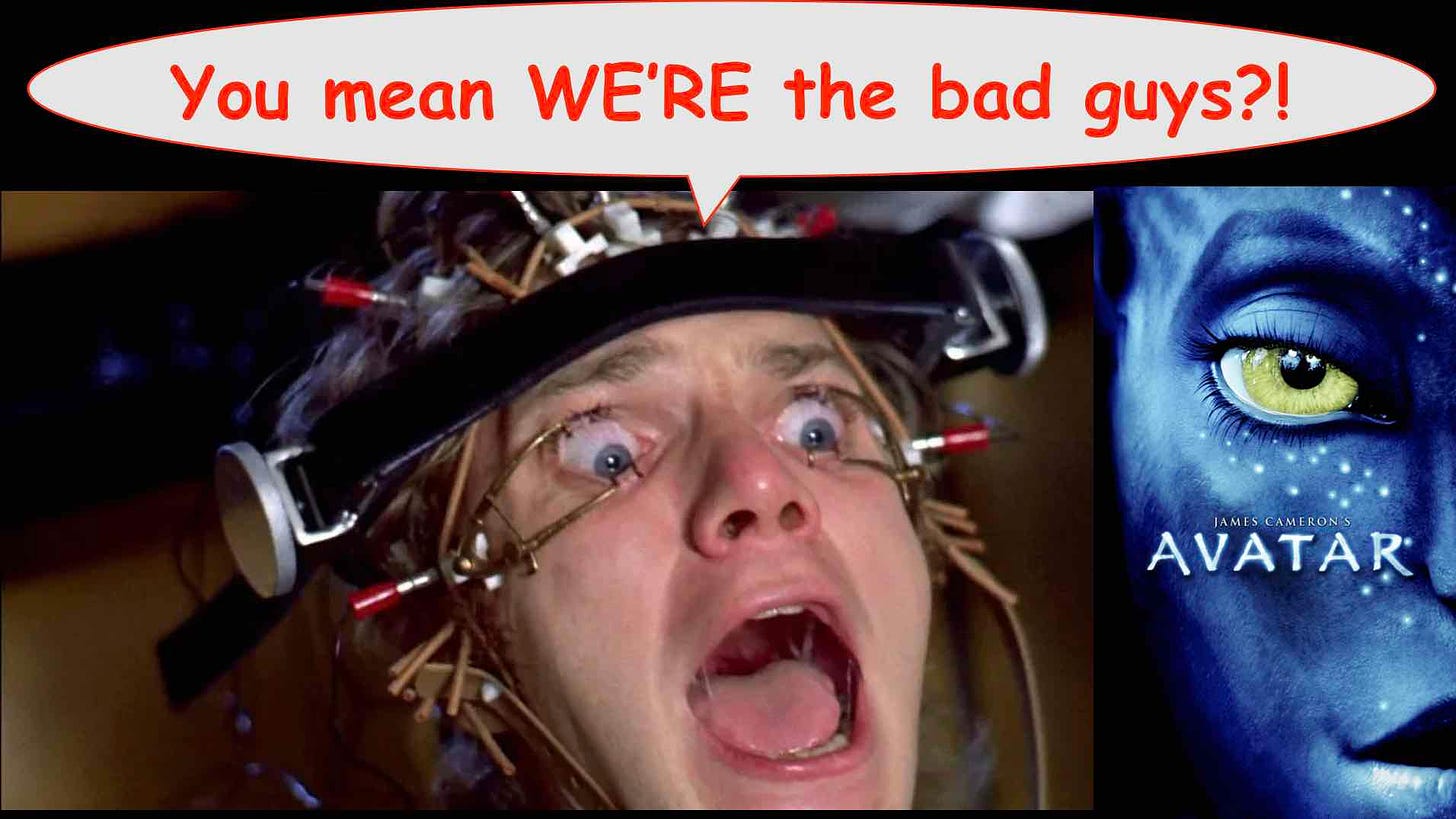Could "Avatar" Deprogram Americans and Israelis?, by Kevin Barrett
I was honored to be featured in yesterday’s Tehran Times. The front page announces Iran’s “clean victory” with its successful retaliation for Israel’s attack on its Damascus consulate.
Ali Hamedin recently interviewed me for his two-part Tehran Times article on science fiction and colonialism. (Here’s Part 2 ). Much of the interview turned on James Cameron’s film Avatar, a barely-disguised polemic against US and Zionist imperialism-colonialism. By painting his Resistance blue and making them ten-foot-tall jungle-dwellers, he distracted mainstream Western viewers enough to trick them into cheering for the Resistance. But when they leave the theater, it’s a different story. David Swanson:
“People know this going into the movie, and do not care. For better, and certainly for worse, they do not care. Millions of people stand in lines, shell out big bucks, wear stupid-looking 3-D glasses, sit in the dark for three hours, identify with twelve-foot-high pointy-eared blue people, cheer as the credits roll, and simply do not care that actual human beings suffer the same fate as the computer-generated creations, albeit without miraculous happy endings.
“Imagine if a tenth of the people who now sympathize with these bony blue beings were to take three hours to read a book or watch a movie about the people of Iraq or Afghanistan or Pakistan or Yemen or Iran. Our real planet would then be a different world.”
I’m not sure the masses are capable of spending three hours reading a book. What they need is a good, truthful propaganda movie. And that’s pretty much what Avatar was. The only problem is that its audiences were allowed, or even encouraged, to retain their psychological defenses against the obvious truth that they are the bad guys.
So here is my modest proposal: Cameron needs to re-release Avatar. But instead of 3D glasses, the Western audience will be offered free popcorn laced with a proprietary blend of scopolamine and MDMA (perfected ahead of the re-release via focus groups). Before and after the movie, a kindly Mr. Rogers figure dressed as Abu Obaida will explain to them that the film is really about the Resistance in the Middle East—namely the Palestinian Resistance (Hamas, Islamic Jihad, the al-Aqsa Martyr’s Brigade, the Mujahedin Brigades, the Popular Resistance Committees, the DFLP) as well as Kata’ib Hezbollah in Iraq, AnsarUllah (Houthis) in Yemen, and so on. As they leave the theater, Resistance fundraisers will solicit contributions, and anyone who doesn’t dig deep will be required to remain for the next screening (and another bowl of popcorn). If necessary, their eyes will be taped open à la Alex in Clockwork orange.
My full Tehran Times interview
1- In your opinion, what approach has James Cameron adopted in Avatar towards the colonial policies of the United States and the West in general? How successful has he been in his narration?
Avatar is a polemical film criticizing US imperialism in general, and US aggression against Iraq in particular. The film depicts an American attempt to invade and occupy Pandora, a distant planet, in order to exploit its mineral resources—just as the US had invaded and occupied Iraq, in part due to its oil resources, a few years before the film was made. Avatar invites the audience to identify with the victims of US aggression, in this case the indigenous Na’vi, to share their grief at the destruction of their culture and ecosystem, and to applaud their military resistance against the US aggressors. Cameron is quite successful in creating a realistic and engrossing fictional world of Pandora, and in convincing a mass American audience to identify with the victims of US imperialism.
2-What makes the audience relate Cameron’s narrative directly to the US occupation of Iraq after September 11?
It’s remarkable that Cameron was able to convince a mass American audience to cheer for military resistance against US imperialism. How did he do it? First, he made it deniable. Had he made Pandora a more arid planet, like Dune, and made the Na’vi look like Arabs or Muslims, the audience could not have feigned igorance about his pro-Resistance message. Had they been forced to recognize that the film was unequivocally trying to convince them to cheer for the Iraqi, Afghan, and Palestinian Resistance, most of the American audience, brainwashed by 90%-Jewish Hollywood to hate those groups, would have balked.
But since Pandora is a lush, steamy, jungle planet, and the Na’vi look more like Native American dwellers of the Amazon Basin than West Asian Muslims (and are ten feet tall and blue-skinned in any case) the audience is invited to pretend, if it likes, that the film is not really about the war in Iraq. This gives the audience permission to cheer for a Resistance that was, at the time of the film’s release, killing significant numbers of American solders, by pretending not to know what they are really cheering for.
Cameron facilitates this vicarious act of “treason” (to American imperialism) through the film’s surreal, dreamlike quality, which lulls the viewer into a willful suspension of disbelief accompanied by willingness to become fully immersed in the film’s alternate reality. Avatar’s subversive message is coded in dream-logic, which, as Freud among others noted, often uses symbolic images to represent their opposites. (For example, it is believed here in Morocco that a dream of getting married is an omen of death.) By making Pandora a lush, humid, jungle planet—the opposite ecosystem of arid West Asia—Cameron uses dream logic to signal that his film is about the Iraqi and Afghan resistance. And since dreams are the world where our hidden desires come to light, yet in disguise, Cameron seems to have tapped into a deeply-hidden, powerfully-repressed American desire to defect from the Empire and join the Resistance. Today, with the majority of American 18 to 24 year olds fully supporting the Palestinian Resistance in its al-Aqsa Storm war against Zionist genocide—an astonishing development, epitomized by the self-sacrifice of Aaron Bushnell—it seems that that hidden desire is leaving the land of cinematic shadows and emerging into the full light of day.
3-What made Hollywood filmmakers use aliens to represent the “other” in science-fiction works? (whether in works such as Spielberg’s War of the Worlds, which is in line with Bush’s “war on terror”, or works such as Avatar, which criticizes the colonial policies of the United States)
Hollywood’s use of aliens to represent “other” nations and cultures reflects the American historical experience. The US was founded by Northern Europeans, mainly Protestants, who viewed the “red-skinned savages” and “primitive negroes” as radically different from themselves. The taboo against miscegenation reflects that “othering.” (Latin America, invaded by Spanish and Portugese Catholics who were quite willing to marry natives and blacks, had a different experience.) As the US expanded to become a globe-straddling empire, it kept encountering foreign peoples and cultures who needed to be “othered” so as to justify killing and exploiting them and stealing their resources. This extreme “othering” in the US national character largely explains Hollywood’s use of aliens as tokens of other human nations and cultures.
4- Are you familiar with H.G. Wells’s War of the Worlds, a novel that is considered a pioneer of science-fiction literature? What do you think about the fact that the first work of science fiction criticized the British empire by making a comparison between the Martian invasion of Earth and Britain’s treatment of its colonies?
I read War of the Worlds as a teenager and haven’t re-read it since, though I listened to the Orson Welles radio broadcast a few years ago. HG Wells seems to have made his aliens conspicuously non-human in appearance and inhuman in behavior as a critique of the inhumanity of British colonialism. Anyone even vaguely familiar with the literature of British colonialism, from Orwell’s “Shooting an Elephant” to E.M. Forster’s A Passage to India, knows that the “stiff upper lip” British went out of their way to avoid meeting their colonial subjects on a basis of human equality. Instead, they pretended to be emotionless, ultra-competent non-human “aliens,” “a breed above” who could shoot elephants or humans without reason or emotion, who went out with mad dogs in the noonday sun, and who generally pretended to be a different, superior species, capable of inhuman psychopathic mass killing if necessary. To many “natives,” the Brtitish must have seemed rather like the Martians depicted in War of the Worlds.
5- What potential is there in the science-fiction genre that filmmakers use to express their ideas about colonialism?
Science fiction gives filmmakers (and authors) an ideal opportunity to use Brechtian alienation and related effects to make audiences look with fresh eyes on scenes they had always taken for granted and therefore not really seen. Like fantasy, science fiction typically sets human action in distant times and places, so audiences see the familiar re-enacted as the unfamiliar. For example, Cameron’s Avatar distances its critique of US imperialism by placing it in the “long ahead and far away” world of future space exploration.
One of the most interesting science fiction critiques of US imperialism-colonialism is found in selected novels of Philip K. Dick. Unfortunately, his novels that re-imagine US imperialism and colonialism as conquests of Mars or other planets, such as Martian Time-Slip, The Three Stigmata of Palmer Eldritch, and Clans of the Alphane Moon, have not yet been made into feature films. Dick’s view of US imperialism is important and unsual in that, unlike most other science fiction authors, he enters into the inner lives of the imperialists and colonizers and finds them terrifyingly empty, haunted by an existential alienation that is hard to distinguish from mental illness.
6- If you want to give a general explanation about the relationship between the science-fiction genre and colonial concepts, or point out another point about the films in this field, there is no problem.
Science fiction grows out of the grand narrative of progress that dominated the West from the 18th-century Enlightenment through the 20th century. During this period, conventionally-educated Westerners lost faith in traditional religious grand narratives, and replaced them with faith in science and progress. Not coincidentally, this was also the period of Western imperialist colonization of most of the world. Science fiction emerged as a branch of literature that both exalts science and the power it brings to conquer and colonize, and also critiques the scientistic worldview and accompanying imperial-colonial adventures.





